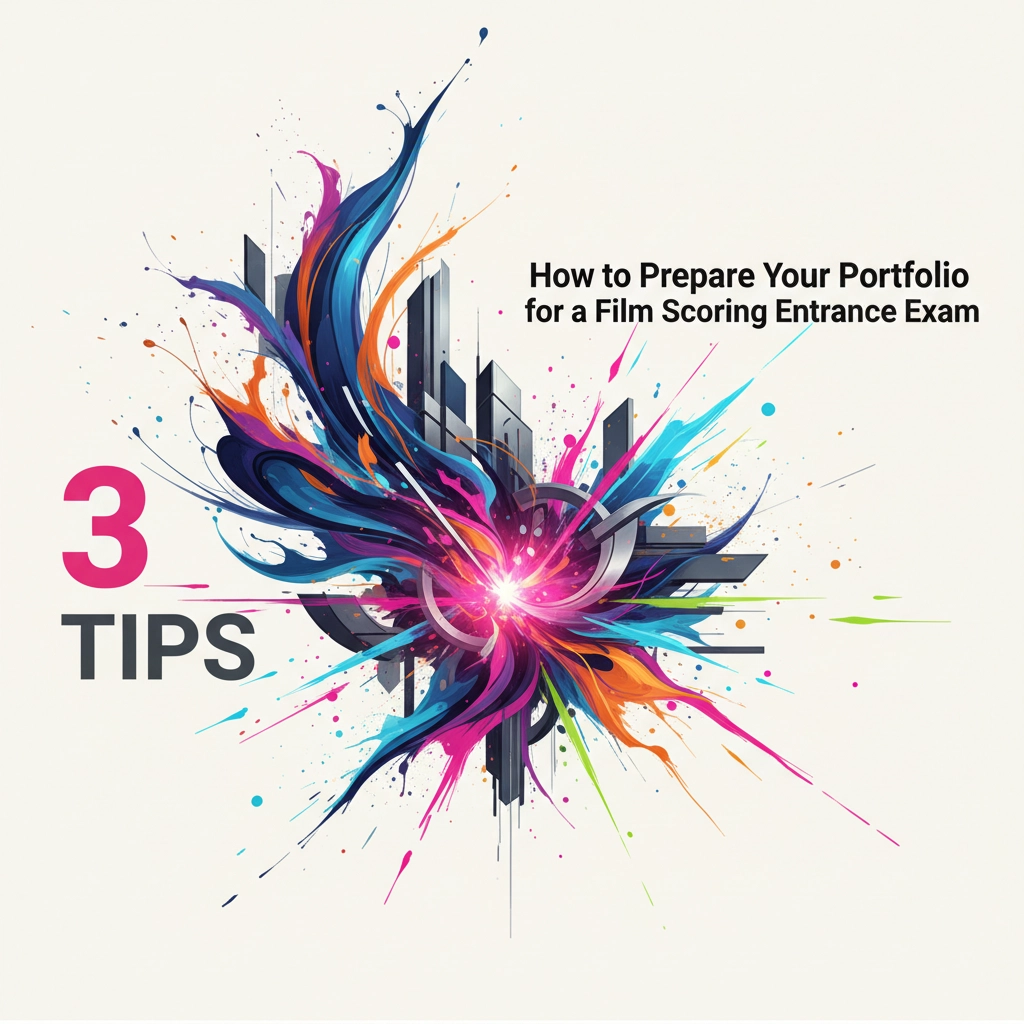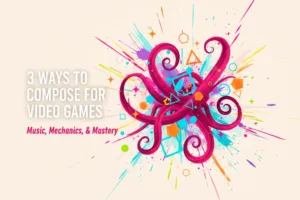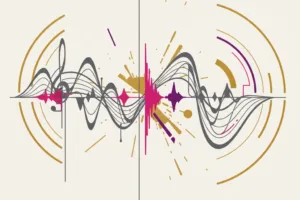
How to Prepare Your Portfolio for a Film Scoring Entrance Exam
- Posted by Filip Sijanec
- Date September 20, 2025
- Comments 0 comment
Reading time: 7 minutes
Getting into a prestigious film scoring programme like NFTS, RCM, or other top music composition courses might feel intimidating, but here’s the truth: admissions panels aren’t expecting you to arrive as the next John Williams. You’re applying to learn, not to prove you’ve already mastered everything. The key is demonstrating genuine passion for music for film and TV, basic technical competency, and a clear vision of what you want to achieve.
Let me guide you through exactly what you need to know to create a portfolio that stands out for all the right reasons.
Understanding What Panels Actually Want
First, let’s dispel a common myth. Entrance exam panels for scoring for games and film programmes aren’t looking for students with extensive professional credits or Grammy-worthy compositions. They’re searching for individuals who show:
- Genuine interest in the field of media composition
- Basic musical literacy and understanding of harmony
- Clear goals for what they want to achieve during their studies
- Potential for growth rather than current perfection
Think of your portfolio as a conversation starter, not a finished masterpiece. The panel wants to see where you are now and envision where you could be after their programme shapes your skills.
Building Your Portfolio Strategically
Your portfolio should tell a story about your journey into composition for screen. Here’s how to approach it strategically:
Start with Short Film Credits
Even unpaid work counts! If you’ve scored student films, indie shorts, or collaborated with filmmaker friends, include these experiences. These credits demonstrate that you understand the collaborative nature of media scoring and have real-world experience working to picture.
Action step: Reach out to film students at local universities or browse platforms like Stage 32 to find filmmakers needing music. Even scoring a 3-minute short film gives you valuable portfolio material.
Assist Industry Professionals
One of the most overlooked portfolio strengtheners is assisting established composers. This doesn’t mean you need connections to Hans Zimmer – local commercial composers, theatre composers, or even wedding videographers using custom music all count as industry experience.
What assisting demonstrates:
- Understanding of professional workflows
- Ability to work within tight deadlines
- Knowledge of client communication
- Exposure to real industry practices
Secure Industry Recommendations
A recommendation from someone working in the field – however small their role – carries significant weight. This could be:
- A composer you’ve assisted
- A director you’ve worked with
- A music supervisor you’ve met at industry events
- A graduate from the programme you’re applying to
These recommendations provide external validation of your potential and work ethic.
The Importance of Written Scores
Here’s where many applicants stumble: they focus entirely on impressive audio recordings while neglecting their written scores. Don’t make this mistake.
Scores Don’t Need to Be Performed
Panels want to see your music theory for screen composers’ knowledge through notation, not necessarily hear a full orchestral recording. A well-notated piano reduction or chamber arrangement often impresses more than a poorly executed full orchestral mockup.
What panels assess in your scores:
- Notation clarity and accuracy
- Basic harmonic understanding
- Melodic development and phrasing
- Structural awareness
- Attention to detail in markings and dynamics
Demonstrating Musical Literacy
Your written scores prove you can communicate musical ideas to other musicians – an essential skill for any professional composer. Focus on clean, readable notation rather than overly complex arrangements that might obscure your fundamental musical understanding.
Technical Skills: DAWs and Digital Mockups
While you don’t need to be a DAW workflow training expert, some technical knowledge definitely helps your application. Modern media composition heavily relies on digital mockup composing, and showing basic proficiency demonstrates you’re prepared for contemporary industry practices.
Essential DAW Skills to Develop
- Basic sequencing and editing
- Understanding of virtual instruments
- Simple mixing and balancing techniques
- Sync-to-picture fundamentals
- File management and project organisation
You don’t need to create Hollywood-quality mockups, but showing you can produce listenable demos of your compositions using technology will strengthen your application significantly.
Focus on Musical Content Over Production
Remember, panels are primarily assessing your compositional abilities, not your production skills. A simple piano and strings arrangement that serves the story effectively impresses more than an over-produced track that lacks musical substance.
Setting Clear Goals and Intentions
One aspect many applicants overlook is articulating clear, specific goals for their studies. Generic statements like “I want to learn film scoring” won’t differentiate you. Instead, consider:
Specific areas of interest:
- Orchestration for media and live ensemble writing
- Game music composition and interactive scoring
- Documentary scoring and non-fiction narratives
- Period drama and historical research for authentic scoring
- Horror and thriller scoring techniques
Career aspirations:
- Collaborating with specific types of filmmakers
- Scoring for particular genres or formats
- Combining composition with other roles (editing, sound design)
- Working in specific markets (animation, commercials, streaming)
Technical goals:
- Mastering advanced orchestration techniques
- Developing signature sound palettes
- Learning specific software or hardware
- Understanding music business and rights management
How Sound Arcade Can Support Your Journey
Preparing for entrance exams can feel overwhelming, but you don’t have to navigate this process alone. At Sound Arcade, we specialise in 1:1 composition lessons and portfolio guidance for film schools, offering personalised mentorship that addresses your specific goals and challenges.
Our Approach to Portfolio Preparation
Through our private composition coaching, we help you:
- Identify your strongest existing work and areas for improvement
- Develop new compositions specifically for your portfolio
- Refine your written scores for maximum impact
- Prepare for interviews and auditions
Our film composer mentorship programme provides insights from working industry professionals who understand exactly what admissions panels seek. We’ve guided numerous students through successful applications to top programmes, including NFTS entrance exams and RCM entrance exams.
Personalised Guidance Makes the Difference
Rather than generic advice, our composer career mentoring addresses your individual strengths, challenges, and aspirations. We understand that every applicant brings unique experiences and goals, so we tailor our guidance accordingly.
Whether you need help with orchestration lessons, DAW workflow training, or understanding music theory for screen composers, our comprehensive approach ensures you’re thoroughly prepared for your entrance exam.
Creating Your Action Plan
Ready to start building your portfolio? Here’s your step-by-step approach:
Immediate Steps (Start Today)
- Inventory your existing work – gather any compositions, recordings, or scores you’ve already created
- Identify gaps in your portfolio based on programme requirements
- Research specific programme expectations for your target schools
- Begin networking within your local film and music communities
Medium-term Goals (Next 3-6 Months)
- Complete 2-3 new compositions specifically for your portfolio
- Collaborate on at least one short film project
- Develop relationships with potential recommenders
- Improve your notation software skills and score presentation
Long-term Preparation (6+ Months Out)
- Refine and professionally format all portfolio materials
- Secure strong recommendations from industry contacts
- Prepare for interviews and live portfolio presentations
- Consider professional guidance to ensure your portfolio represents your best work
Your Next Steps
Remember, the journey into professional film composition begins with a single step. Your portfolio doesn’t need to be perfect – it needs to be authentic, well-crafted, and demonstrate your potential for growth.
The most successful applicants combine genuine passion with strategic preparation. They understand that composing for film and television requires both artistic vision and practical skills, and they approach their portfolio preparation with this balance in mind.
Whether you’re just beginning your composition journey or looking to formalise existing skills, the right preparation and guidance can make all the difference in your application success. Start building your portfolio today, and take the first step towards your dream career in media composition.
Filip Sijanec is an award-winning composer and educator based in London. He serves as Professor at the Royal College of Music and NFTS, and teaches composition and music technology at ICMP and ThinkSpace, mentoring aspiring composers. He is the composer for an Oscar-nominated film and creates original music for film, games, theatre, and commercials.
On Ear Training & Craft: Why Your Ear Matters More Than Your Plugins
You may also like

How to Compose Music for Films

How to Compose Music for Video Games

